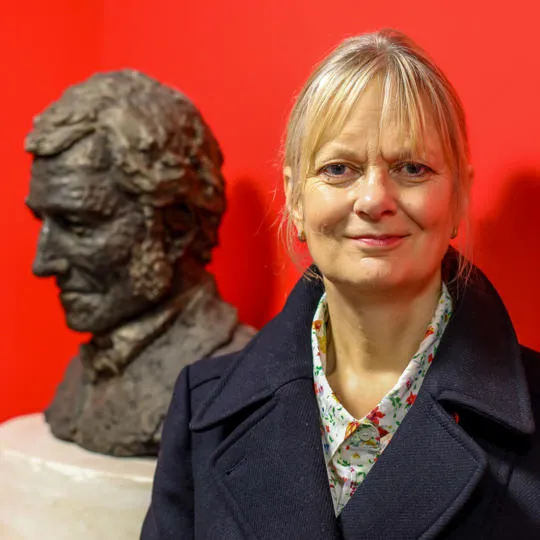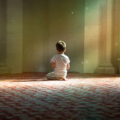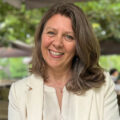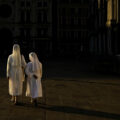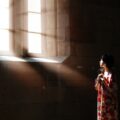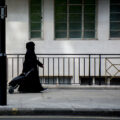Tradition in transition: Linda Woodhead on women’s roles in the paradoxical religion of tomorrow
Tradition in transition: Linda Woodhead on women’s roles in the paradoxical religion of tomorrow
In an interview with the European Academy on Religion and Society (EARS), Professor Linda Woodhead MBE FBA FRSE, a distinguished British sociologist of religion and scholar of theology and religious studies, critically rethinks women’s roles during modernisation. In doing so, she discusses their part as tradition-carriers against men’s social roles. She also emphasises how gender is significant in religious contexts, and how alternative spiritualities and rising fundamentalism represent very different responses to changing gender roles and the family. Woodhead calls for better-informed and inclusive public and political recognition of diverse religious practices and women’s importance in them. She offers a view of some underlying constancy within the religious landscape, despite the more commented-upon changes.
The role of women in theology and its impact on the future of religion is a subject of significance and interest. The European Academy on Religion and Society (EARS) explores this topic in an interview with Professor Linda Woodhead MBE FBA FRSE, a distinguished British sociologist of religion and a scholar of religious studies, currently serving as the F.D. Maurice Professor in Moral and Social Theology at King’s College London. Woodhead addresses the transformation of women’s roles in religion, anticipating their continued importance and evolving influence on the future of faith practices globally.
Women and secularisation
Linda Woodhead’s academic work has been significantly shaped by her early engagement with gender studies, which profoundly influenced her understanding of religion and theology. She reflects on this impact, noting, “At the start of my career, gender studies was a new, emerging, and very interesting field that was reshaping the way that we thought about religion and theology.” Woodhead’s research has paid attention to the role of women within religions in liberal democracies, especially those with Christian heritages, while also taking into account a global perspective.
“At the start of my career, gender studies was a new, emerging, and very interesting field that was reshaping the way that we thought about religion and theology.”
This has led to significant contributions such as her article Gendering Secularization Theory (2005), which challenges the male bias in traditional secularisation theories by highlighting women’s distinct experiences in modernisation and urbanisation. She explains, “I wanted to think about how different it was for women; the process of urbanisation and, at least for middle-class women, exclusion from public life and professional life … Women carried tradition into conditions of modernity whereas men could modernise in a more straightforward way.” Woodhead highlights how women were part of the process of modernisation, but not fully integrated into it, functioning as carriers of traditions, including religious ones. “They weren’t full citizens of modernisation if you like,” she notes, discussing how women’s roles in socialising children and maintaining religious and moral standards in the home and neighbourhood contributed significantly to the persistence of religious traditions in the face of modernisation.
Abuse and other challenges in religious contexts
Woodhead is currently actively involved in a major project examining sexual abuse in religious contexts. Titled Abuse in Religious Settings, this AHRC-funded project led by Professor Gordon Lynch investigates the sensitive issue of sexual abuse in various religious settings. Her own work package includes interviews with long-term survivors to ask how they have survived – what has helped and what has hindered. This project builds on her earlier book, A Sociology of Religious Emotion (2012), co-authored with Ole Riis. The book focuses on understanding emotions in religious contexts as socially-constructed and culturally-mediated phenomena, rather than looking solely through a psychological lens. This exploration of emotions, Woodhead notes, was “prompted by taking more seriously male and female experiences, and showing how they operate within different ‘emotional regimes’ that shape what they can feel and express.”
Woodhead describes the current project’s methodology, involving interviews carried out jointly by Woodhead and Jo Kind with survivors who disclosed their experiences a decade or more ago. The interviews aim to understand the survivors’ journeys, asking questions such as, “Do you still have your faith? Did abusive experiences in a religious setting lead you to abandon or transform your faith? What else has been important in your journey of healing?” We know from other research that perpetrators are mostly male and victims are more often female, but Woodhead points out that “some of the male respondents have said it’s more shaming for men to talk about and admit to being the victim of abuse, so numbers may be an underestimate.” Others on the project are considering, amongst other things, whether there is a gender dimension in institutional response to the abuse.
Woodhead notes that there has been a significant cultural and institutional shift in addressing these issues, noting that “We’ve seen a big ethical and cultural change in that it is now possible to talk about abuse and trauma.” This shift is underscored by the mainstreaming of the discussion around “trauma” and the need to “safeguard” individuals within institutions. Woodhead comments that “The media has done more than academics to bring abuse to light, and deserves credit for that.” However, Woodhead argues that addressing abuse in religious settings is complex and should not merely be handled through medical and legal frameworks. There is still a long way to go in understanding the effects of abuse in religious contexts, how to prevent it, and how to repair the damage done.
“We’ve seen a big ethical and cultural change in that it is now possible to talk about abuse and trauma.”
Women as carriers of tradition
Woodhead regards women both as religious innovators and, quite often, as carriers of religious tradition, in different combinations. She points out that women have outnumbered men in Christianity, until recently. She states, “Women still tend to be the carriers of tradition in the 21st century, but not only in the politically-recognised male-led ‘world’ religions; also in the kinds of religion or spirituality that go below the radar and are often dismissed as ‘superstition’.” Woodhead offers specific examples, noting the persistence of traditional practices like astrology, and internet-supported growth of interest in tarot reading. She observes, “In every part of the world and every religious tradition, there are things like horoscopes, astrology, practical healing techniques, and various forms of divination.” In the West, women dominate. Woodhead highlights the consistent interest in these traditions: “If you look at the UK where we’ve got good polling data since the 50s, it’s a completely steady graph. Around one in five people visits a fortune teller or believes in horoscopes and this number is steady. The number is higher among women; about two-thirds are female.” Beneath the more commented-upon changes in religion, there is an undertow of activity, much of it pre-modern in its tradition, in which women remain very active, but which is sidelined by mainstream religious and secular viewpoints.
“In every part of the world and every religious tradition, there are things like horoscopes, astrology, practical healing techniques, and various forms of divination.”
Women in a paradoxical future religion
Woodhead observes a continued flourishing of practical forms of religion, such as tarot, fortune telling, yoga, and mindfulness. Historically predominant in church memberships, women have been leaving the historic churches in greater numbers than men, and those churches have mostly been becoming more conservative, not least in terms of gender roles and defence of ‘traditional’ family: “Christianity has gone from being predominantly a religion for women led by men to being a religion still more led by men but attracting men in equal numbers.”
Woodhead then reflects on the broader global religious landscape, pointing to the major importance of the rise of fundamentalism from the early 20th century, alongside changes in women’s roles. She identifies the emergence of fundamentalism across major world religions as the key change in global religion of her lifetime: “The biggest story of religious change in my career has been the rise of fundamentalism.” These movements, she explains, are characterised by their adherence to a set of unchanging fundamentals, as well as exclusivity and the belief in possessing the absolute truth, and imagery of a war between good and evil, truth and (secular) falsehood. The rise in fundamentalism overshadowed moderate and liberal religious forms and has become intertwined with politics, raising questions about future religious trends and potential backlashes within these conservative movements.
“The biggest story of religious change in my career has been the rise of fundamentalism.”
In this changing religious context, Woodhead highlights the role of women. She reiterates that although many women have left churches which retain male dominance, some remain carriers of tradition but now in non-mainstream religious practices, distancing themselves from major religious institutions affected by fundamentalism and conservative values. “Women often carry these traditions … they’ve carried them through from the premodern and they still are very visible and prominent, albeit constantly changing and adapting, as they always have,” she notes. However, she also points out the lack of female representation in public and politically-recognised religious leadership, indicating a persistent gender disparity. Women’s involvement is now more visible in non-traditional forms, as “the big religions have become more gender-conservative, now presenting themselves as counter-cultural.”
Woodhead expands on this by discussing women’s historical position in relation to modernisation: “Women were in a very different position in relation to modernisation.” She emphasises that while men could adapt to and embrace modernisation, aligning with religious leadership and fundamentalism, women were largely excluded from this process. This exclusion resulted in women maintaining traditional roles, contrasting with the evolving male-dominated institutional leadership and fundamentalist movements, and likely led to their increased involvement in alternative forms of spirituality and religion.
Addressing this disparity, Woodhead advocates for a more inclusive approach from states and religious institutions. She calls for greater recognition of the diversity in religious and spiritual practices and the roles women play in them, emphasising the need for states to be more critical and knowledgeable about religion to ensure genuine impartiality that includes women and minority groups.
Woodhead concludes by affirming the continued significance of religion in human life, marked by dynamic shifts, particularly in women’s roles and participation. “I hypothesise that a minority of people, perhaps one in five, are deeply religious and spiritual and it really matters to them. I think that may be a historical constant. What changes is the social acceptability of religion…” Woodhead reflects on the constant nature of spirituality and its changing social visibility and acceptability, pondering its future prominence in the political, cultural, and social spheres. She envisions women finding opportunities regardless of whether more conservative and fundamentalist institutions value their contributions: “Women will be creative, spiritual, and religious in their own ways in whatever sphere they can find; they’re opportunistic. If the men in leadership want their gifts and skills, that’s up to the men to make way. It’s not going to really affect the quality of people’s spiritual lives; they’ll continue to find their own ways of doing things.”
Woodhead thus emphasises the paradoxical relationship between these two dynamics in contemporary and future religion: the increase in women’s importance in below-the-radar non-traditional roles coexists with the strengthening of fundamentalism in traditional religious institutions.
“I hypothesise that a minority of people, perhaps one in five, are deeply religious and spiritual and it really matters to them. I think that may be a historical constant. What changes is the social acceptability of religion…”
Who is Linda Woodhead?
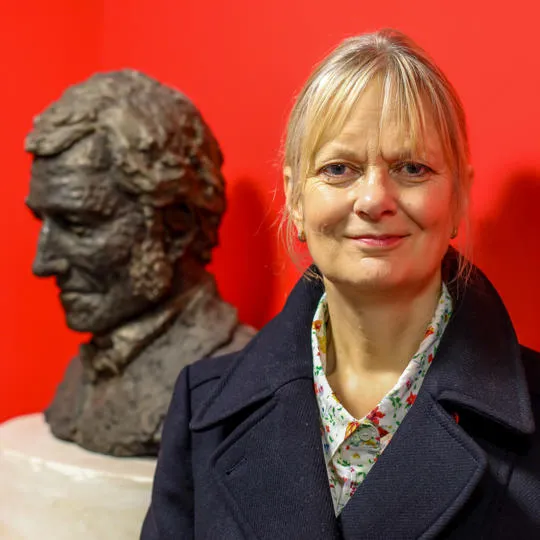
Born on February 15, 1964, Linda Jane Pauline Woodhead, MBE FBA FRSE, is a distinguished British sociologist of religion and a scholar of theology and religious studies, and is the F.D. Maurice Professor in Moral and Social Theology at King’s College London. She heads the Department of Theology and Religious Studies there, following a successful tenure at Lancaster University. Woodhead’s research interests span a wide range, including religion, magic, spirituality, values and ethics, and contemporary religious and cultural change.
Her work seeks to understand the decline of institutional religion, particularly churches, and the concurrent rise of alternative spiritualities. She is an expert in exploring the dynamics of religion in relation to social change, particularly in modern contexts. Among her numerous publications, notable works include Unknowing God: Towards a Post-Abusive Theology (2022), Gen Z, Explained: The Art of Living in a Digital Age (2021), and The Spiritual Revolution: Why Religion is Giving Way to Spirituality (2005). These works showcase her extensive research on the evolving landscape of religious beliefs and practices. Woodhead’s expertise is recognised widely, earning her several honours, including being appointed as a Member of the Order of the British Empire (MBE) in 2013 for her services to higher education. She has also been elected a Fellow of the British Academy (FBA) and the Royal Society of Edinburgh (FRSE). Her engagement extends beyond academia into public discourse, where she collaborates with journalists and participates in broadcasts on topics related to religion, culture, and values. Woodhead has also been instrumental in initiating public debates about faith, co-founding the Westminster Faith Debates with Charles Clarke, and significantly contributing to how religion is approached in schools and public life.
This interview was conducted by Muhammad Faisal Khalil and Simone Kroes.
Explore the interview series on the future of religion:
- Religious orthodoxy and the future of religion: A conversation with Philippe Portier
- Economy, society, and religion: Revisiting Max Weber with Mathew Guest
- Through the apocalypse: Graham Ward on religion’s future in the wake of migration
- Completing our reality: Bénédicte Lemmelijn on women shaping tomorrow’s religion
- Religion at a crossroads: A conversation with Matthias Smalbrugge on the future of religion
